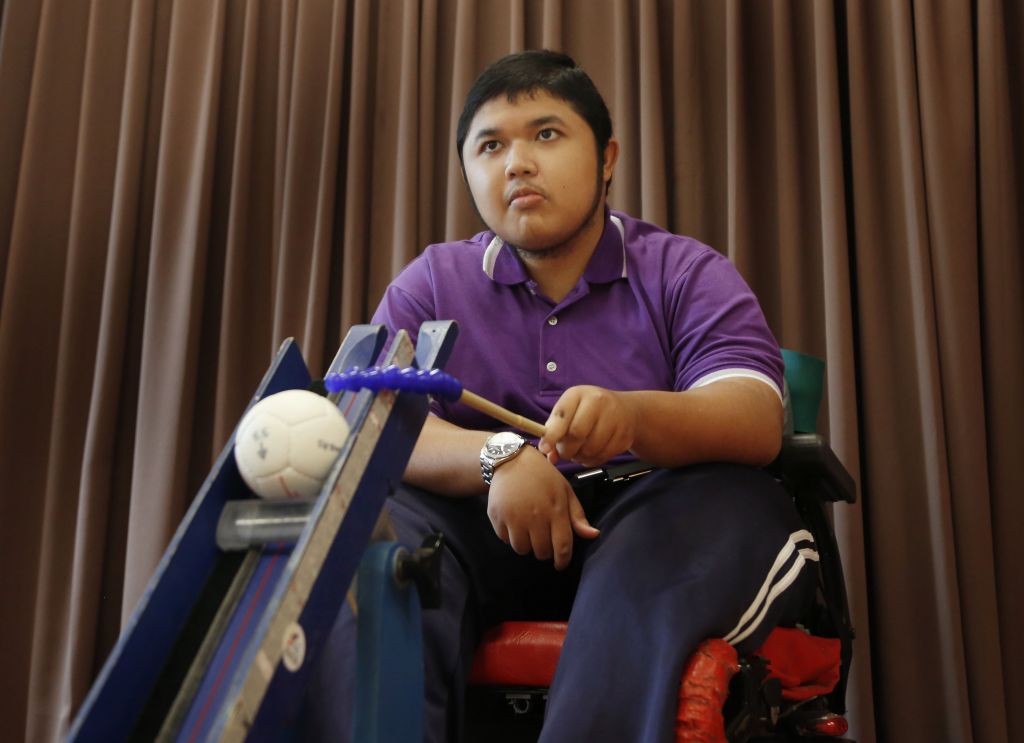
SINGAPORE — Growing up, Muhammad Saifudeen Abdul Salim often threw tantrums or stewed in silence over the fact that he was born different.
At the age of four, after his parents noticed he had difficulty climbing the stairs, he was diagnosed with muscular dystrophy, a condition where his muscles will weaken progressively.
Even though the 19-year-old now has to depend on a motorised wheelchair to get around, he is no longer a sullen or angry young man.
He has become the “abang” (Malay for ‘big brother’) to newcomers at the Muscular Dystrophy Association Singapore (MDAS), holds a part-time job, and can travel independently on the MRT for activities.
As a child, Saifudeen said his knees would buckle without reason, causing him to trip and fall multiple times daily. Because of his “clumsiness”, his madrasah classmates would isolate him during playtime, and that made him lose his temper easily.
“I was sensitive over small things because I felt sad that I’m on a wheelchair. I’m different from others, so I felt sad. And because of that, I got angry over silly things,” he said. “I didn’t like people shouting in class and I would throw things at them — water bottles, pencil cases.”
At 13, he left the madrasah and started travelling with his mother to countries such as China, India and Sri Lanka to seek alternative treatments for his condition.
For four years after that, when he was not travelling, he was cooped up at home with the television or computer games as his only entertainment, while his three siblings studied or worked.
His housewife mother and port supervisor father were protective of him because of his condition, and were reluctant to let him travel alone.
“When I was alone at home, I would scream or talk to myself,” said Saifudeen. “I didn’t feel happy.”
When he turned 17, his life took a turn for the better. His elder sister managed to convince their parents to let him learn new skills at MDAS.
In January last year, Saifudeen arrived at the MDAS premises reluctantly to learn computer skills. Initially, he refused to talk and replied to questions with monosyllabic answers.
“I wanted to talk. I thought of asking questions. But I didn’t know if it would be okay to ask them,” he said. “So I didn’t greet anyone. I was very quiet.” As the days went by, he began to open up to the instructors, volunteers and other members. He picked up art and computer design, and learned to play modified bocce — a ball sport — and football.
And from taking private transport arranged by MDAS to get to the association in Bishan, he started travelling on the MRT alone from his Lakeside home this year — with tools such as rods to help him press the lift button and to tap his EZ-Link card.
He dreams of being able to invent tools or modify furniture for others who suffer from the same condition, but lack the know-how to do so.
For now, he is happy with small achievements, like being able to do graphic design for retailer Gobblershop three days a week and earning his own keep. He also takes the MRT on his own thrice weekly to MDAS for various activities such as physiotherapy and sports.
Having left his dark days behind, he makes it a point to reach out to new faces at MDAS and be their friend.
“I think I wasted a lot of time being very angry in the past. Now I try to be patient,” he said. “I have the confidence that one day, everything will change (for me). I don’t know how it will change. But I’ll just move on with life now.”